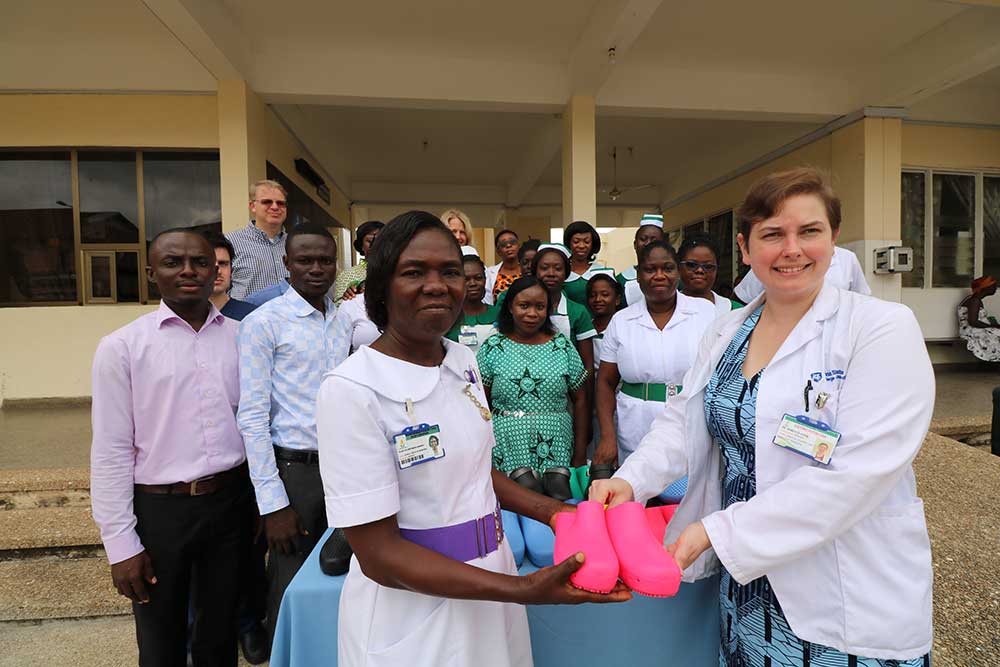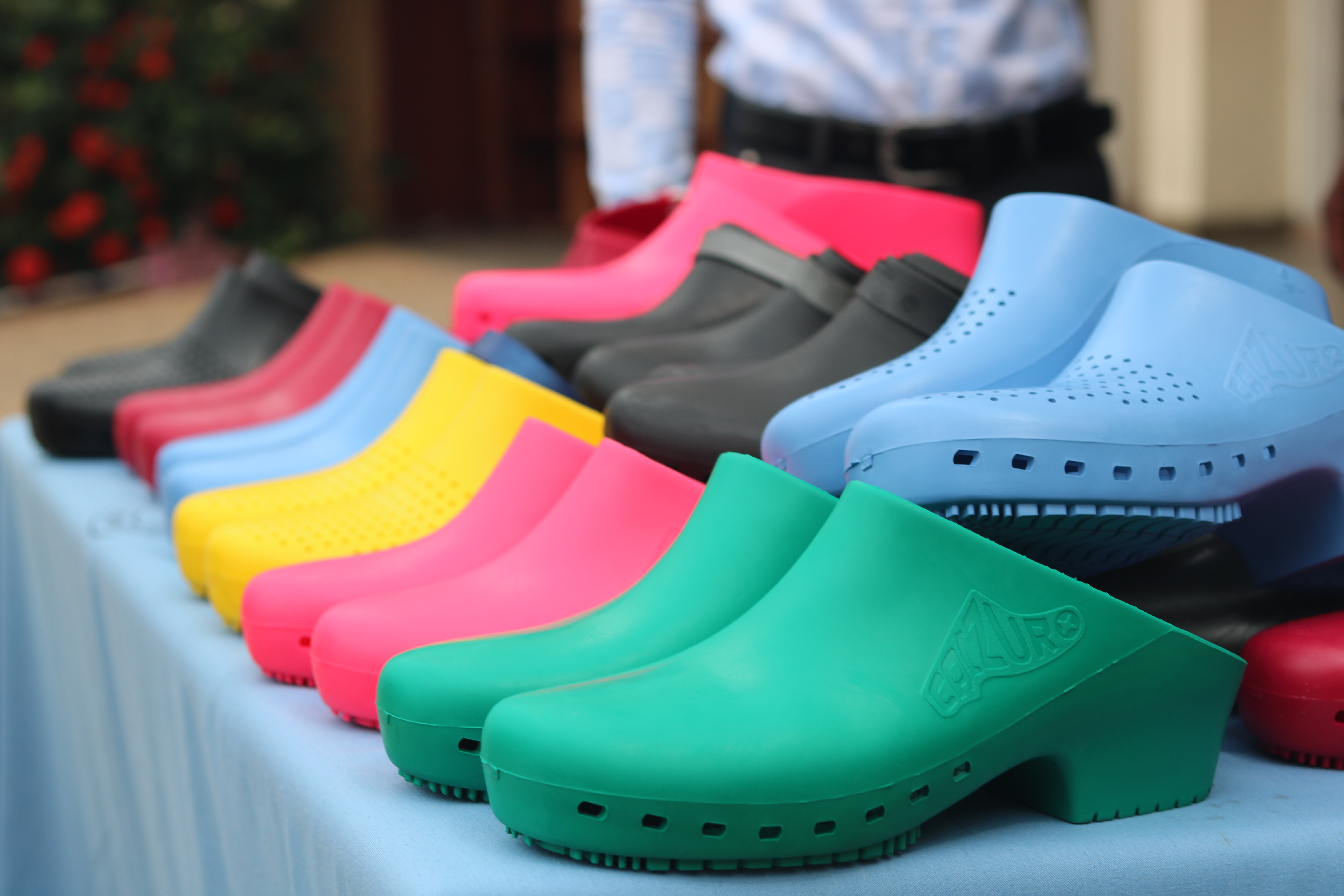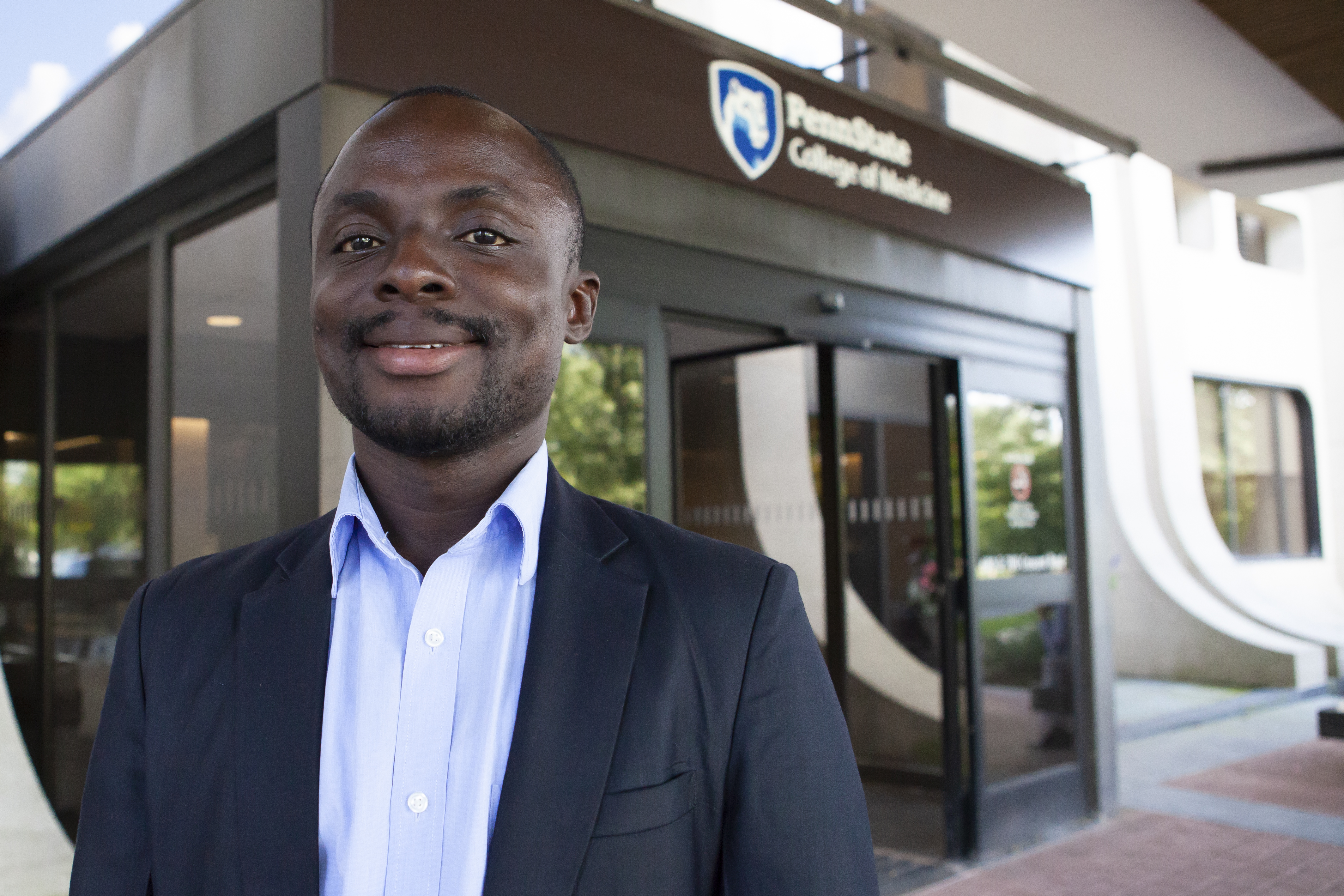College of Medicine global health collaboration reaps benefits here and there

By Carolyn Kimmel
Penn State College of Medicine student Becky Koob took the old adage “walk a mile in another’s shoes” literally when she volunteered at a hospital in Kofordua, Ghana, last summer.
After working long days at the Eastern Regional Hospital in worn-out footwear, she decided to do something about it.
“To maintain sterile conditions, the staff can’t wear outside shoes in the hospital, so there was this pile of beat-up, communal shoes for everyone,” said Koob, a fourth-year medical student who is part of Penn State College of Medicine’s Global Health Scholars program. “There were never enough to go around. I had to track down shoes every time I went.”
Koob contacted multiple shoe companies asking for donations and found a willing partner in Calzuro, Italian-made shoes distributed in the U.S. from a base in Ohio.
The company donated 120 pairs of hospital-grade shoes and galoshes that can be put in an autoclave to be sterilized.

Calzuro, an Italian shoe company, donated 120 pairs of hospital-grade shoes and galoshes to Eastern Regional Hospital in Ghana after Penn State College of Medicine student Becky Koob requested them. Photo courtesy of Xavier Candela.
“The staff was very happy,” said Koob, who presented the shoes in a formal ceremony with the director of nursing. “I’m interested in doing small things that can help in consistent ways. Shoes are a small thing to us, but to the hospital staff in Ghana, they’re huge.”
During her first trip to Ghana as a first-year medical student, Koob settled on becoming a surgeon after she was able to shadow the hospital’s only surgeon on weekends.
“I want to include global health in my life,” she said. “It’s important to me that when one has much, you share with those who do not.”
Gaining perspectives like that along with firsthand experience over two separate visits makes the 10-year-old Global Health Scholars program particularly attractive to medical students, who increasingly value cross-cultural experience.
“We’re the only U.S. medical school doing a global health longitudinal curriculum built over four years,” said Dr. Ben Fredrick, director of the College of Medicine Global Health Center. “Our program values relationship with the local community and builds relationship over time.”
To be considered for inclusion, a country must have both a College of Medicine faculty champion and an international partner engaged at the site, and the country must be considered safe, he said. Participating countries are Zambia, Peru, Australia, Japan and Ghana.
“Being completely away from familiar turf helped me grow personally,” said Xavier Candela, now in his second year at the College of Medicine, after returning from Ghana last June. “Also, seeing how tough the patients are and the conditions they suffer through really made me appreciate what we have and are able to do in U.S. hospitals.”
Candela is already looking forward to his return trip as a fourth-year student in 2020. Until then, he is participating in a joint research project on breast cancer. This year, Fredrick said students were linked with projects that College of Medicine faculty are working on, such as a breast cancer surgery initiative, a radiology project and basic life support and CPR training at the hospital.
“It’s exciting to be part of global health and see immediate impact from your efforts,” Candela said. “Our protocols are so well established here that it almost makes it more difficult to see a need and meet it in a timely fashion.”
That’s exactly what Richard Yeboako, deputy human relations manager and international relations coordinator at Eastern Regional Hospital, noticed when he made his first trip to the U.S. last August.
“Over here, you have a lot of litigation, so you must always be on your toes to ensure proper protocol and policies are followed. Providing care seems more cumbersome in the U.S., but also safer for the patient,” he said, noting that litigation is rare at his hospital.
“Medicine where I come from is steeped in witch doctors, passed down through the generations, and people seek medical care from us when the traditional healer has failed,” Yeboako said. “Often, patients could have been saved if they had come to us earlier, but we find ourselves able to offer only palliative care. “
The goal of Yeboako’s trip was to foster collaboration and focus on best practices, several of which he planned to implement back home.
“Where I come from, medical care is thought to be the job of the nurses and doctors. Here, I learned if you have housekeeping staff keeping the patient room as clean as possible, the patient gets better care and goes home without getting an infection,” Yeboako said. “I will discuss this with the management of my hospital as a way to reduce our infection rate.”

Richard Yeboako of Eastern Regional Hospital in Ghana learned about medical best practices during a visit to Penn State College of Medicine through the Global Health Scholars program.
While his hospital has a CT scanner, there is no radiologist on-site to read scans. Now, his hospital’s server will be equipped with a web application that will allow the possibility for some scans to be loaded online and read remotely by Penn State Health Milton S. Hershey Medical Center radiologists.
The collaboration started through a grant from The Hershey Company about six years ago when the College of Medicine partnered with MountCrest University in Ghana.
“This year, we have someone from our medical center—students, residents or faculty—in Ghana more than 50 percent of the year,” Fredrick said. “I think that demonstrates incredible enthusiasm and momentum among our colleagues.”
If you're having trouble accessing this content, or would like it in another format, please email the Penn State College of Medicine web department.
